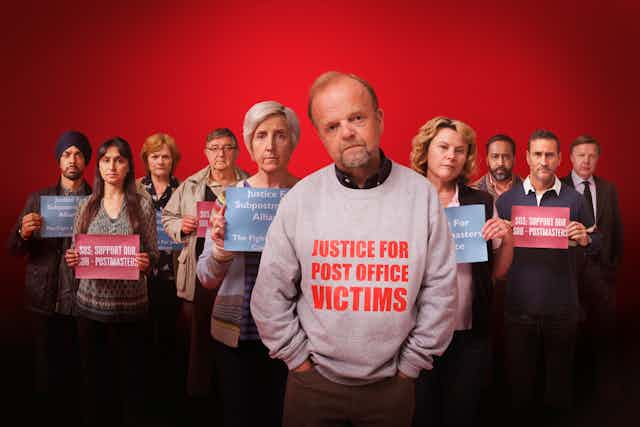If you have been watching the news lately, then you might have heard of the Post Office Horizon IT scandal. From 1999 to 2015, more than 900 sub-postmasters were prosecuted by the Post Office after faulty software wrongly recorded that money was missing from branches. The miscarriage of justice only seems to be coming to the fore of public consciousness now, a staggering ten years after the fact.
The four-part ITV drama, Mr Bates vs The Post Office is responsible for the sudden attention. The series recounts the true story of the legal battle between former sub-postmaster Alan Bates and over 700 sub-postmasters and mistresses.
To date it has been watched by a staggering 9.2 million viewers. The drama has stirred public indignation and pushed ministers to accelerate the justice process for the postal staff wrongly accused.
It has also caused Paula Vennells, the chief executive of the Post Office from 2012 to 2019, to hand back her CBE. Fujitsu, the company responsible for the system, has admitted that is it likely their staff knew glitches were wrongly recorded in Post Office accounts five years before prosecutions were stopped and that they are responsible for providing compensation.
You might be surprised that a TV show has inspired this sort of reaction, rather than a serious journalistic investigation (the first of which broke the story in 2009). Or a public inquiry – which has been going on without much attention since 2022. However, this isn’t the first time dramas have been able to inspire public sentiment. Mr Bates is just one in a long tradition of British docudramas that have inspired real change.
Drama raises awareness
In 1990, the film Who Bombed Birmingham, starring Martin Shaw and John Hurt, raised serious doubts as to the guilt of the Birmingham Six and led to their subsequent release after 17 years of wrongful imprisonment. The six Irishmen had been sentenced to life in prison in 1975 after two IRA bombs went off at pubs in Birmingham, killing 21 people. The film discredited the government’s most prominent forensic investigator and went as far as identifying the actual culprits.
Jimmy McGovern’s 1996 Hillsborough docudrama increased the momentum that led to a public inquiry into the UK’s biggest football tragedy. And the 2017 BBC drama, Three Girls increased awareness of grooming and child abuse, encouraging the government to change legislation on the sentencing of perpetrators.
This rich tradition likely began in 1966 with the Ken Loach BBC play Cathy Come Home, which sparked a huge public reaction to the plight of homelessness.
Like the political issues these docudramas deal with, the lack of public interest until now in the Post Office scandal is not for lack of news coverage. It’s not that the story wasn’t important, it’s that it wasn’t until this TV series that people were really moved, or truly grasped the seriousness and real human impact of the computing error.
These docudramas operate by not solely focusing on the facts of the story, but by repositioning the context of the events. Often, they are framed as a David and Goliath battle where “little” people without power are pitted against powerful institutions.
In shifting the emphasis of the narrative from the straight facts to the people involved, docudramas have been able to “cut through” and reach an audience, keeping them engaged in a way other forms of communication about the issue haven’t.
How drama invites change
The power of dramatisation to influence change is something I have a lot of experience with as a theatre practitioner who specialises in verbatim theatre. This form of theatre uses the words of real people to tell stories that explore a range of social and political issues and offer a voice to unheard perspectives.
I work on a project called The Verbatim Formula (TVF) which involves a team of arts practitioners and young researchers with experience in the UK care system. Our research doesn’t dramatise care experiences but rather uses elements of verbatim performance to make and share testimonies that are much less about the facts of care and more about how, from the young researchers’ perspectives, care felt for them.
TVF aims to help the voices of young people who have experienced care to be heard by social workers and other professionals who work in the care system. Our hope is that by appreciating further how the decisions they make impact young people in care, care staff reflect on how they do their jobs. Small changes in care service practice at a local level can have a huge impact on the young people in the system.
We have found that when these testimonies are shared, they are not seen as a catalogue of harrowing narratives, but as communicating not feeling listened to, or isolated – and sometimes ashamed. The professional staff engaging in TVF have confirmed that the verbatim formula offers those who operate services like social care the potential for more empathy. They also gain a deeper appreciation of the impact of their decisions on those in care.
Similar feelings suffuse the recent TV drama about the Post Office scandal. In this way, drama and performance play incredibly important and powerful roles championing those who don’t have a voice. They create spaces for a different kind of advocacy, or even campaigning.
Mr Bates vs The Post Office seems to have rejuvenated a 25-year-old campaign for justice for a group of wronged people. It has made millions empathise with Alan Bates, Josephine Hamilton and their colleagues and become indignant on their behalf. We are seeing real action inspired by art.

Looking for something good? Cut through the noise with a carefully curated selection of the latest releases, live events and exhibitions, straight to your inbox every fortnight, on Fridays. Sign up here.

